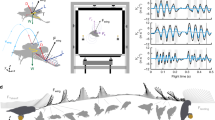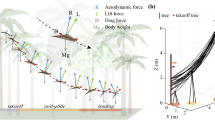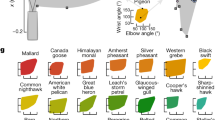Abstract
COMING out from Queenstown on September 10 on her way toward Boston, the ss. Arabic was accompanied for some hours by a large flock of gulls. For the most part these birds were visibly working, flapping their wings, but occasionally a few would cease flapping and merely sail along for considerable distances, keeping up with the ship or even gaining upon it, sometimes descending, sometimes ascending, apparently at will, with no perceptible action of their wings except, now and then, a slight effort which seemed to be needed for preserving equilibrium, not for support or for propulsion. The wind was of such direction and velocity that the smoke from the ship's funnel went astern in a trail making an angle of, perhaps, 30° with the keel.
This is a preview of subscription content, access via your institution
Access options
Subscribe to this journal
Receive 51 print issues and online access
$199.00 per year
only $3.90 per issue
Buy this article
- Purchase on Springer Link
- Instant access to full article PDF
Prices may be subject to local taxes which are calculated during checkout
Similar content being viewed by others
Author information
Authors and Affiliations
Rights and permissions
About this article
Cite this article
HALL, E. Sailing Flight of Birds. Nature 90, 161–162 (1912). https://doi.org/10.1038/090161c0
Issue Date:
DOI: https://doi.org/10.1038/090161c0
Comments
By submitting a comment you agree to abide by our Terms and Community Guidelines. If you find something abusive or that does not comply with our terms or guidelines please flag it as inappropriate.



